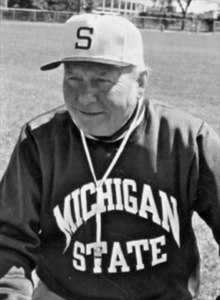Muddy Waters (American football)

Waters at Michigan State University
|
|
| Sport(s) | Football |
|---|---|
| Biographical details | |
| Born |
January 30, 1923 Chico, California |
| Died | September 20, 2006 (aged 83) Saginaw, Michigan |
| Playing career | |
| 1946–1949 | Michigan State |
| Position(s) | Fullback |
| Coaching career (HC unless noted) | |
| 1954–1973 | Hillsdale |
| 1975–1979 | Saginaw Valley State |
| 1980–1982 | Michigan State |
| Head coaching record | |
| Overall | 173–96–7 |
| Accomplishments and honors | |
| Championships | |
| 7 MIAA (1954–1960) 1 GLIAC (1979) |
|
| Awards | |
|
NAIA Coach of the Year (1957) Michigan Coach of the Year (8 times) NAIA Coach's Hall of Fame |
|
|
College Football Hall of Fame Inducted in 2000 (profile) |
|
Frank "Muddy" Waters (January 30, 1923 – September 20, 2006) was an American football player and coach. He served as the head coach at Hillsdale College (1954–1973), Saginaw Valley State University (1975–1979), and Michigan State University (1980–1982), compiling a career college football record of 173–96–7. Waters was inducted into the College Football Hall of Fame as a coach in 2000.
Waters was born in Chico, California and grew up in Wallingford, Connecticut, where he attended The Choate School. He played fullback for Michigan State from 1946 to 1949 under coaches Charlie Bachman and Clarence Munn.
His Hillsdale Dales/Chargers teams won 34 consecutive games from 1953 to 1957 while participating in the Michigan Intercollegiate Athletic Association. In 1955, his 9–0 team refused to play in the Tangerine Bowl when game officials prohibited the team's black players from participating. He was named NAIA Coach of the Year in 1957, a year in which the team played in the Holiday Bowl and was chosen by the Washington D.C. Touchdown Club as the best small college team in the country. In his final year at the school, its stadium was renamed Frank Waters Stadium.
After leaving Hillsdale with a 138–47–5 record, Waters went on to serve as the first head coach of the Saginaw Valley State University Cardinals from 1975 to 1979, posting a 25–26–2 record and capturing a Great Lakes Intercollegiate Athletic Conference title in his final season.
...
Wikipedia
